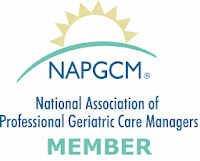A question that I, and many of my care manager colleagues frequently receive: "So, how did you get into this field, anyway?" Unfortunately, care management is a profession about which most of the public is still unaware, and when people learn about our critical role as advocates for disabled adults in the health and long term care systems, I usually get one of two responses: "I wish I'd known about you five years ago when I was caring for my own mother!" or "Sounds like interesting work. What kind of training does it require?"
It's a great question, with a complicated answer. Professional care managers come from a variety of backgrounds, including social work, nursing, gerontology, therapy, and psychology (among others). Professional care managers have several years of experience working with disabled adults in a supervised, clinical setting. And professional care managers are certified through one of four recognized programs.
A certified professional care manager differs from a patient advocate, a senior advisor, a patient navigator, or an elder advocate, designations without the same education, experience, or stringent certification requirements. There are many good people who care deeply about the health and well-being of our elders working in these fields, but effective advocacy through a complicated diagnosis or difficult family dynamics requires more than a kind heart, or some personal experience in caring for a member of one's own family. It requires clinical knowledge, a deep understanding of the health and long term care systems, the ability to maintain an objective perspective, and accountability to a set of professional standards and ethics.
 |
Every member of Elder Care Guides'
clinical team is a member of NAPGCM:
Amy Abrams, Jean Alton, Terry Ehlke,
Cassie Farrell, Norman Hannay,
and Susan Valoff |
There are many paths that one can take to becoming a professional care manager, and we work in a variety of settings, including private companies and non-profit organizations. The work is challenging and demanding, but individuals who enjoy problem-solving find it very rewarding. Membership in the National Association of Professional Geriatric Care Managers
(NAPGCM) is an important first step.
If you or someone you know are interested in learning more about the profession of care management, NAPGCM will be hosting a free informational webinar on Tuesday, October 15th.
Click here for information and to register.

